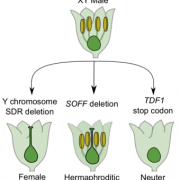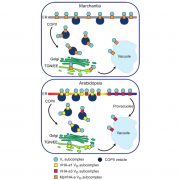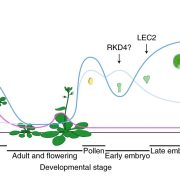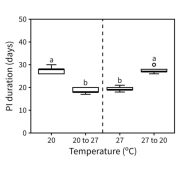ATP-citrate lyase B1 regulates pollen development in Arabidopsis
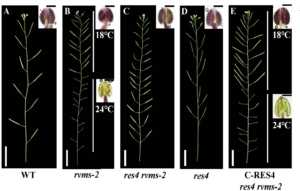 The genetic regulation of male fertility in Arabidopsis thaliana involves multiple factors, including ATP-Citrate Lyase (ACL), a key enzyme in cytoplasmic acetyl-CoA production. The thermosensitive male-sterile mutant reversible male sterile-2 (rvms-2) exhibits normal fertility at low temperatures but becomes male sterile at higher temperatures. This mutant shows defective exine formation and cytoplasmic leakage during pollen development. RVMS encodes a GDSL lipase/hydrolase protein with lipase activity, essential for proper pollen wall formation. Previous studies identified several rvms-2 suppressor mutants that restore fertility. Among these, restorer-2 (res2) and restorer-3 (res3) encode cell-wall-modifying enzymes that delay degradation of the pectin and callose walls, thereby improving pollen viability. In this new study, Ma et al. characterized restorer-4 (res4), another suppressor mutant of rvms-2, revealing that RES4 encodes ATP-Citrate Lyase B1 (ACLB1), a subunit of ACL that catalyzes the conversion of citrate to acetyl-CoA. The res4 mutation alters the citryl-CoA lyase domain of ACLB1, leading to defective exine formation and reduced microspore size. RES4 is expressed in the tapetum and regulated by the transcription factor MS188, a key player in sporopollenin synthesis. Lipid staining assays indicate significantly reduced lipid accumulation in the tapetum and locules of res4, linking ACL activity to sporopollenin production. The smaller microspore size in res4 contributes to partial restoration of fertility in rvms-2, suggesting that reduced microspore volume lowers the requirement for protective cell wall structures. This study underscores the importance of ACL-derived cytoplasmic acetyl-CoA in pollen development and offers new insights into fertility restoration mechanisms, with potential implications for hybrid crop breeding strategies. (Summary by Muhammad Aamir Khan @MAKNature1998) Plant Physiol. 10.1093/plphys/kiaf044
The genetic regulation of male fertility in Arabidopsis thaliana involves multiple factors, including ATP-Citrate Lyase (ACL), a key enzyme in cytoplasmic acetyl-CoA production. The thermosensitive male-sterile mutant reversible male sterile-2 (rvms-2) exhibits normal fertility at low temperatures but becomes male sterile at higher temperatures. This mutant shows defective exine formation and cytoplasmic leakage during pollen development. RVMS encodes a GDSL lipase/hydrolase protein with lipase activity, essential for proper pollen wall formation. Previous studies identified several rvms-2 suppressor mutants that restore fertility. Among these, restorer-2 (res2) and restorer-3 (res3) encode cell-wall-modifying enzymes that delay degradation of the pectin and callose walls, thereby improving pollen viability. In this new study, Ma et al. characterized restorer-4 (res4), another suppressor mutant of rvms-2, revealing that RES4 encodes ATP-Citrate Lyase B1 (ACLB1), a subunit of ACL that catalyzes the conversion of citrate to acetyl-CoA. The res4 mutation alters the citryl-CoA lyase domain of ACLB1, leading to defective exine formation and reduced microspore size. RES4 is expressed in the tapetum and regulated by the transcription factor MS188, a key player in sporopollenin synthesis. Lipid staining assays indicate significantly reduced lipid accumulation in the tapetum and locules of res4, linking ACL activity to sporopollenin production. The smaller microspore size in res4 contributes to partial restoration of fertility in rvms-2, suggesting that reduced microspore volume lowers the requirement for protective cell wall structures. This study underscores the importance of ACL-derived cytoplasmic acetyl-CoA in pollen development and offers new insights into fertility restoration mechanisms, with potential implications for hybrid crop breeding strategies. (Summary by Muhammad Aamir Khan @MAKNature1998) Plant Physiol. 10.1093/plphys/kiaf044


